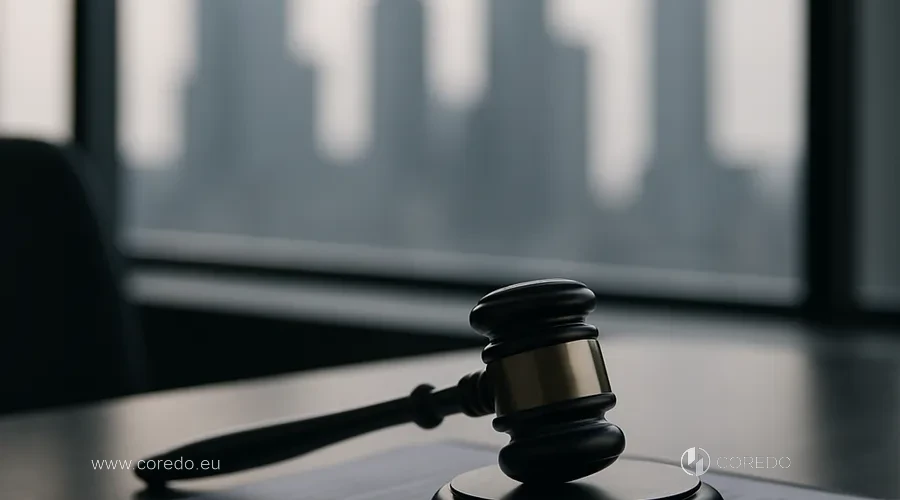81% of international companies face legal and operational risks due to insufficiently clearly defined powers of the director and ineffective corporate governance. In the era of globalization, when Registration of legal entities in the EU, Asia and Africa becomes part of a scaling strategy, the role of the company director goes far beyond formal leadership. Today, the director’s management decisions determine not only the speed of entering new markets, but also the business’s resilience to regulatory changes, the effectiveness of financial control and compliance with international compliance standards.
In this article I, Nikita Veremeev, CEO of COREDO, share the experience and strategic decisions that the COREDO team implemented in projects for registering and supporting companies in the EU, Asia and the CIS. You will receive not only an in-depth analysis of the director’s powers and tasks, but also practical recommendations on how to build effective governance, meet AML and compliance requirements, protect shareholders’ interests and ensure the long-term sustainability of the business.
Powers of the company director: main aspects

The powers of the company director cover a wide range of issues, from strategic decisions to organizing day-to-day activities and representing the firm’s interests externally. Still, these aspects can vary significantly depending on the country, legislation and corporate traditions, which is important to consider when comparing the director’s powers across different jurisdictions.
Powers of the director in different countries
In international practice, the powers of a company director are determined by a combination of corporate law, the company’s articles of association and internal corporate policies. For example, when registering legal entities in the EU, the director becomes an executive body authorized to conclude transactions, represent the company in relations with government authorities and oversee the implementation of corporate strategy. In the Czech Republic and Estonia, the director bears fiduciary responsibility to shareholders and must adhere to principles of corporate ethics. In the United Kingdom, the director’s powers are detailed in the Companies Act 2006, where special attention is paid to the director’s Due Diligence, protection of beneficial owners’ interests and transparency of corporate reporting.
In Asian countries, for example in Singapore, the legislation requires at least one local resident director, which is critical for compliance with ACRA requirements and successful company registration. In Singapore and Hong Kong, the emphasis is on internal control and implementing compliance procedures, while in some African countries the director’s powers are often less formalized, which requires special attention to international corporate law and protecting shareholders’ interests when building holding structures.
Director decisions for company growth
The company director is the key figure in strategic planning and implementing corporate strategy. His decisions determine development directions, investment priorities, management structure and corporate culture. In international structures the director is responsible for adapting the business model to the requirements of different jurisdictions, integrating ESG factors into corporate governance and implementing digital solutions to optimize business processes.
The COREDO team has implemented projects where the director’s strategic decisions not only accelerated the registration of legal entities in the EU and Asia, but also created a sustainable platform for scaling the business while minimizing tax and compliance risks. In modern conditions the director must master business analytics tools, manage C-level management and build a succession planning system for the long-term sustainability of the company.
Delegation of powers: how to manage personnel
Effective delegation of powers is one of the key tasks of the CEO. In international companies, where personnel management by the director covers multicultural teams, it is important not only to distribute responsibility but also to build a system for monitoring effectiveness. Best practices include implementing KPIs and director performance metrics, regular feedback sessions, as well as developing a corporate culture that supports initiative and process transparency.
The solution developed by COREDO for clients with subsidiaries in different countries showed: a clear delegation system integrated with internal control and anti-corruption procedures makes it possible to minimize operational risks and increase team engagement in achieving strategic goals.
Tasks of the company’s CEO

The tasks of the company’s CEO cover the key aspects of managing and developing the company: from strategic decisions to daily control of operations and finances. Understanding these tasks allows you to build effective enterprise operations and achieve sustainable growth.
Operational and financial management of the business
Control of business processes and the director’s financial control are the foundation of effective company management. Tasks of the generalThe director’s responsibilities include not only organizing daily operational activities, but also ensuring the transparency of financial reporting, implementing business analytics tools and regularly assessing process efficiency using KPIs.
In COREDO’s practice, special attention is paid to automating financial control and implementing digital tools for monitoring corporate reporting. This approach allows the director to timely identify deviations, optimize business processes and increase return on investment even amid rapid company growth.
Director’s risks and compliance
Company risk management is a strategic function that requires a systemic approach to internal control, implementation of anti-corruption procedures and compliance with international AML directives. The director and the compliance team must build KYC check processes, monitor the director’s fulfillment of AML obligations and interact with the compliance officer to minimize compliance risks.
In addition, strengthening transparent communications and fostering a strong corporate culture become an integral part of an effective compliance system.
Corporate culture and communications
Building corporate culture: a strategic task of the director that affects business resilience and its attractiveness to investors. Corporate ethics, transparency of communications, protection of shareholders’ interests and effective interaction with regulators become an integral part of the director’s functions in an international structure.
In COREDO’s cases of supporting companies in the EU and Singapore, special attention was paid to building a system of external communications that allows the director not only to maintain investor trust but also to effectively respond to requests from regulators and external auditors.
Director’s responsibility: legal and financial aspects

A director’s responsibility covers not only legal but also financial aspects of company management, including protecting shareholders’ interests, complying with legislation and ensuring transparency of all operations. Different countries have their own specifics for holding a director accountable: from civil liability to criminal, which is important to consider when operating internationally. Next we will look at how these mechanisms are implemented in different jurisdictions in Europe, Asia and Africa.
Director’s liability in the EU, Asia and Africa
| Jurisdiction | Main types of liability | AML/compliance specifics | Sanctions for violations |
|---|---|---|---|
| EU | Civil, criminal, administrative, fiduciary | Strict oversight, mandatory KYC/AML procedures | Fines, disqualification, criminal liability |
| Asia | Civil, administrative, less often criminal | Requirements depend on the country, emphasis on internal control | Fines, ban on activity |
| Africa | Depends on the country, often less formalized | Implementation of AML at the registration stage | Fines, license revocation |
In different jurisdictions a director’s liability is determined by a combination of civil, administrative and criminal norms. For example, in the EU fiduciary responsibility and the director’s due diligence are particularly important, while in Asia compliance with internal policies and compliance procedures is emphasized. In Africa requirements may be less formalized, which requires special attention to the corporate structure of the holding and protecting shareholders’ interests.
Liability for AML breaches
Violation of a director’s AML obligations and compliance procedures entails serious sanctions: from large fines and disqualification to criminal liability and license revocation. The COREDO team has regularly encountered cases where non-compliance with AML directives led to account freezes and investigations by regulators. Implementing anti-corruption procedures and regular staff training are key elements of the internal control system that minimize these risks.
Internal audit and risk control
Organizing internal audit and building an internal control system is an integral part of corporate governance. The company director must ensure the transparency of corporate reporting, especially in the EU where disclosure and audit requirements are particularly strict. Solutions implemented by COREDO include automating internal audit processes, deploying digital platforms to monitor compliance with corporate policies and regularly assessing the effectiveness of the internal control system.
Director of an international company: main challenges

For the director of an international company, the main challenges begin already at the stage of entering new markets. Each region sets its own requirements and laws, which requires the manager to be flexible and have a deep understanding of the nuances of company registration and doing business in different countries. Next we will consider the specifics of company formation in the EU, Asia and Africa.
Company registration in the EU, Asia and Africa
When registering legal entities in the EU, Asia and Africa, a key step is appointing a director who meets the requirements of local law. For example, in Singapore the presence of a local resident director is mandatory, and in some EU countries confirmation of the candidate’s qualifications and experience is required. Special attention is paid to the corporate governance structure, the presence of a company secretary and the registration address’s compliance with regulatory requirements.
How to manage business subsidiaries
Control over international units requires the director to implement digital transformation tools, business analytics and process optimization. Implementing digital solutions enables the company director to promptly receive data on the activities of subsidiariesstructures, monitor the implementation of corporate policies, and ensure transparency of corporate reporting.
The COREDO case of supporting a holding with subsidiaries in the EU and Asia has shown that integrating business analytics and automating management processes not only allows scaling the business but also minimizes tax and operational risks.
Engagement with regulators and investors
The company director must build effective communications with regulators, investors and external auditors. COREDO’s practical recommendations include regularly updating corporate policies, preparing for external audits, and implementing tools for transparent engagement with investors. This approach not only minimizes compliance risks but also increases the company’s investment appeal in international markets.
How to become an effective director of an international company

An effective director of an international company is not only a confident leader but also someone able to quickly adapt to different cultures and market requirements. To build a strong team and achieve strategic goals at a global level, it is important to combine professional and managerial qualities, be open to change, and be able to make decisions in evolving circumstances.
Key takeaways and recommended actions
- Ensure that the director’s powers comply with the articles of association and the laws of each jurisdiction: this is the foundation for minimizing legal risks and successfully scaling the business.
- Implement a KPI system and business analytics for regular evaluation of business process performance and strategic decision-making.
- Ensure regular internal audits and automation of compliance procedures — this will enable timely identification and remediation of AML violations and anti-corruption breaches.
- Develop corporate culture by integrating ESG factors and succession planning for the company’s long-term sustainability.
- Use digital management tools and business analytics to monitor the activities of subsidiaries and optimize processes.
- Build a C-level management team capable of effectively delegating responsibility and managing change.
- Regularly update corporate policies and engage with external auditors and regulators to maintain investor trust and minimize compliance risks.
Key questions for entrepreneurs
A company director in the EU is granted powers to manage the business, enter into transactions, represent the organization before government authorities, oversee the implementation of corporate strategy, and ensure that corporate reporting complies with legal requirements.
The director is responsible for preparing corporate documents, complying with company structure requirements (for example, the presence of a local director in Singapore), organizing internal control, and carrying out compliance procedures when opening bank accounts and obtaining licenses.
The director implements KYC procedures, oversees compliance with AML directives, organizes internal audits and staff training, and works with the compliance officer to timely detect and prevent risks.
Use director due diligence, implement internal control systems, automate compliance procedures, and regularly update corporate policies in line with regulatory requirements.
The director builds transparent communications, prepares corporate reporting, organizes external audits, and regularly informs investors about key changes in the company’s activities.
Conclusions on the topic of the article
A competent company director is not only a guarantee of effective management and strategic development but also a key factor in minimizing legal, financial and compliance risks when registering and scaling a business abroad. COREDO’s practice shows that only a comprehensive approach—including legal support, implementation of digital tools, and development of corporate culture—allows achieving sustainable results in international business. By choosing professional support, you invest in the long-term resilience and transparency of your business in the global market.